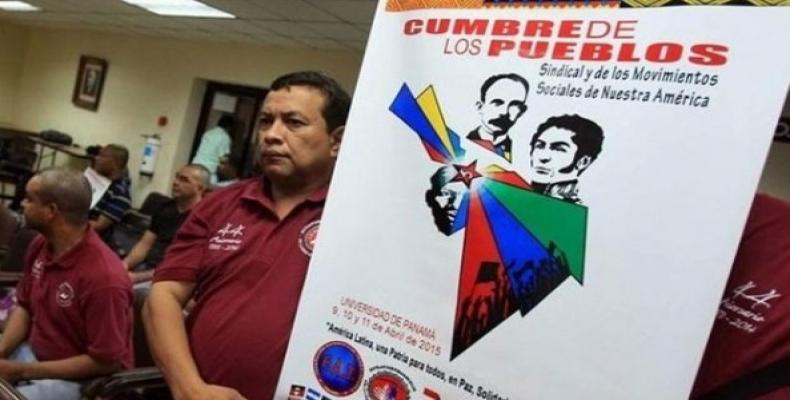Panama City, April 10 (teleSUR-RHC) The Summit of the Americas in Panama City has incorporated parallel meetings. The Youth forum, the Academic forum, the Business forum and the Civil Society and Social Actors forum were organized after a process of selection by the Organization of American States, which also organizes the presidential summit.
However, more than 2,000 social movements and progressive organizations have organized the People's Summit, an event that seeks to express support for the policies advanced in the region in recent years, following the election of numerous left-wing governments.
Ahead of the event, teleSUR interviewed the Ecuadorean delegate Juan Francisco Torres and Panamanian organizer Fernando Cebamanos and discussed the aims of the People's Summit and the historic moment that Latin America is going through.
What Is the Aim of the People's Summit?
The social movements that will participate in the parallel summit include small farmers, indigenous groups, human rights activists, political movements, worker unions and environmentalist organizations.
With such a diverse array of different issues the organizations agreed on an extensive agenda to discuss the most important problems which they believe will not be present in the official presidential event. “We are not an anti-(Americas) Summit. We are a summit that aims at giving voice to the popular movements that are not part of the Summit of the Americas.
Our objective is to raise the issue of fighting poverty, for social equality and the sovereignty and right to self determination of the people. We are discussing things completely different to the Americas Summit agenda,” explained Dr. Fernando Cebamanos, organizer of the People's Summit and President of the Broad Front for Democracy party in Panama.
Juan Francisco Torres, head of the Ecuadorean Communist Youth, said “Taking into account the regional context – specially regarding foreign intervention and the revival of the Monroe Doctrine – we will reject the attitude displayed by the U.S. against Venezuela, which is also against all of the region … we will also support the progressive processes that are underway throughout the region and will help other countries towards overcoming neoliberalism,” explained
How Are Your Demands Going to Reach the Official Presidential Summit?
“Our final demands and conclusions will be sent through (Bolivian) President Evo Morales to the rest of the presidents before the official event ends,” explained Dr. Cebamanos.
“The idea is that our resolutions serve as a wake up call for governments and international institutions to prioritize in solving the demands of social movements and the civil society … if there is no coordination between civil society and political society, this is very difficult because we need to build new institutions to respond to the needs of our time,” explained Torres.
Why Are These Movements Not Participating in the OAS Civil Society and Social Actors Forum?
“From the social movements that are participating in the People's Summit, many organizations and leaders sent their formal requests to participate (in the OAS Civil Society and Social Actors Forum). Organizations such as the National Front for Economic and Social Rights – which is made up of 53 Panamanian organizations – was rejected. The Construction Workers' Union of Panama, one of the largest worker unions in Central America, was also rejected. And several teachers and student leaders were also denied participation,” explained Cebamanos.
According to Juan Francisco Torres, delegations that will travel to the People's Summit have been warned about the presence of far-right Cuban organizations which could generate incidents and provocations. “We know they are going to be people infiltrated from agencies, financed by the U.S. government.
Organizations that have been supporting the ousting of the Cuban government … will try and create disturbances and, as much as possible, delegitimize the Cuban government,” explained Torres.
The selection process and the representative value of the OAS-organized civil society forum have come under scrutiny. As Cebamanos explains, it does not reflect the people of the region. “It is an event that, instead, brings so-called “dissidents” from Venezuela and Cuba to provoke and divert attention from the real problems that are affecting our people,” added the president of the Broad Front for Democracy.
How Do You Interpret the Current Regional Situation in the Context of the Summit?
“Right now we have to create a multi-polar world. That requires efforts from both progressive governments and social movements. There will be a very symbolic act during this summit and it is the presentation of signatures in support of Venezuela (against the U.S. executive order).
This act will show that governments accused of authoritarianism have a widespread democratic, popular support, from the majority of people in their countries. And they also count on international support from the rest of countries and peoples, that are in favor of democracy,” explained Torres. “We believe the OAS has lost legitimacy at the same time that the reality of our countries have changed … The OAS seems not to understand this. A group of countries (within the OAS) is trying to justify U.S. intervention in our internal affairs. For example, the U.S. has sent a carrier to the Panamanian coasts, equipped with rapid deployment jets. This is contrary to Panamanian sovereignty,” explained Dr. Cebamanos.


